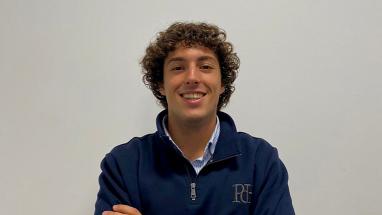
Rodrigo Ribeiro is 21 years old and from Águeda. He holds a degree in Bioengineering from the Faculty of Biotechnology at the Universidade Católica Portuguesa and is pursuing a Master’s in Biomedical Engineering. When discussing ESB, he highlights the value of close-knit teaching and hands-on laboratory practice. Plans? “To make an impact in the healthcare field.” And in his free time? “Music plays a big role in my life.”
Why Bioengineering?
I’ve always been more inclined toward Science, Biology, and even Physics and Chemistry. At one point, I wanted to be a doctor. Then I realized what I wanted was to be somehow connected to healthcare.
What makes the healthcare field so fascinating?
It’s an area where we have a significant impact, and that’s a huge motivation. I’ve always looked for something that would allow me to help people, especially those suffering from illnesses. In Biomedical Engineering, I’m particularly interested in biomaterials. We often don’t realize the enormous impact of this field—small materials introduced in medical procedures have made a huge difference in patients’ lives.
"Laboratory practice is one of the school's distinguishing features."
What has been the most remarkable part of studying at Católica?
When I started my degree, I immediately enjoyed the first subjects, and we began lab work right away. Hands-on laboratory practice is one of the defining aspects of ESB. From the first year, ESB students engage in lab work compared to students from other universities. Another major highlight for me is the close-knit teaching environment and small class sizes, which make a big difference in the learning process.
You’re currently pursuing a Master’s in Biomedical Engineering. What do you expect from this experience?
I hope it opens doors for my professional future, but above all, I want to deepen my knowledge in Biomedical Engineering. This master's program expands on the topics I studied in my undergraduate degree, and I value this continuity. I hope it helps me become more well-rounded professionally and better prepared for the job market.
You are also the President of the ESB Student Association. What motivated you to run for this position?
As a student, I felt that there was a lot that could be done, so I stepped up and believed I had the skills to implement initiatives that would benefit all ESB students.
"It’s an experience that is testing my work ability and leadership skills."
Can you give an example?
We recently organized a Financial Literacy workshop for all ESB students and already have two mental health talks scheduled. Many topics go beyond the scientific fields of our faculty but are crucial for students’ lives. This is an area where a Student Association can make a difference. We are also involved in the Porto Academic Federation and participate in the National Meeting of Student Associations. We want to be engaged in all academic matters. This year, we are launching ESB’s first futsal team to compete in the Porto Academic Championships. Sports are an essential part of university life and a priority for our term.
What has been the most significant part of your experience as President of the ESB Student Association?
It’s an experience that is testing my work ability and leadership skills. I’m sure I will carry a valuable set of experiences into my personal and professional life.
What are your aspirations for the future?
I would like to work in my field in Portugal. Many young people emigrate—some by choice, others out of necessity. I hope to stay here, work in Biomedical Engineering, and contribute positively to the healthcare field.
What do you enjoy doing in your free time?
Music plays a significant role in my life. I completed the eighth grade at the Conservatory, played the button accordion, taught music, and participated in several projects.
Pessoas em Destaque é uma rubrica de entrevistas da Universidade Católica Portuguesa, Centro Regional do Porto.



